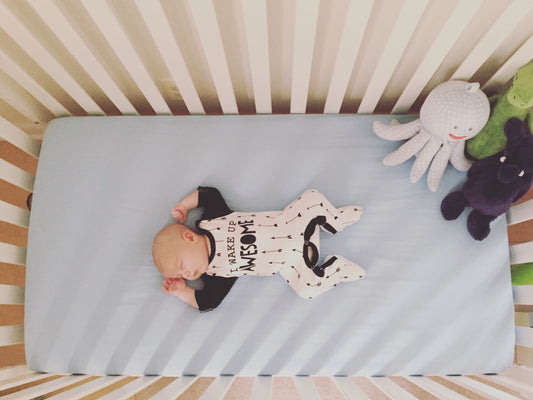The Key to Your Child's Development
You just brought your bundle of joy home from the hospital (eek!). You’ve read every article on feeding and burping, and made sure you have every single item from the latest “Bringing Baby Home” checklist. However, there might be something that slipped through the cracks of your preparation, something far more important than your choice in swaddling blankets: your words.
That’s right. Get ready to talk more than you’ve ever talked before (unless you’re like me and that’s impossible because you never stop talking). In your little one’s first three years of life, their brain will triple in size, and in that time, most of their sensory experiences are coming from your home. Unlike all the other organs we are born with, the brain's key stages of development occur after birth - and that development relies on stimulation and environment.
Extensive research done by psychologists Betty Hart and Todd Risley, authors of Meaningful Differences in the Everyday Experiences of Young American Children, in 1995 indicates that talking and reading to your child from ages 0-3 years has the greatest impact on their development and education level later in life. In fact, children from more talkative households with a more extensive vocabulary are said to have heard 30 million more words by the time they reach three years of age; and those same children are shown to have scored higher in tests of reading and cognitive development by the third grade.
So how do you make sure you're talking to your baby enough? To help you help your little one, we've compiled a list of ways for you verbally interact with your child every day.
1. Tell a story, any story
Sure, reading an encyclopedia might buff your baby's brain to Johnny Bravo levels, but those words lack connection. Instead, opt to tell your baby a story; whether its a fictional tale of two little bunnies or a story from your favorite childhood memory. Stuck on what story to tell? Log into our free VoiceShare app and enter our "Talk" section for storytelling prompts. You can even record those stories and play it back to your little one later!
2. Read side by side
Have your child sit next to you or on your lap while reading to them. Give your child time to look at the pictures, and (if age appropriate) ask them to point to different characters/objects in the book. The newest version of our VoiceShare app allows you to read and record books, and follow along within the app.
3. Speak (and read) with expression and intonation
Both vocal expression and physical gestures will help your child to grasp the emotional connection to your words. Playing face-to-face with your little also one allows them to see your facial expressions up close and connect your words to their meaning.
4. Sing to baby - lullaby karaoke
Tired of talking? Sing to your little one! The repetition of words in songs will help your child to become more familiar with those words and their meanings. Use the "Sing" function in our new VoiceShare app, where you can sing your child's favorite lullabies karaoke style with the lyrics and instrumental music there to help you along the way - so you can finally get those lullaby words right.
So get ready to settle in at home with your newest confidante, speech critic, and story monger, because their all ears and they'll thank you for it later.
-
More resources on the importance talking to baby:
The Language Development Survey (LDS)www.aseba.org
A synopsis of the Language Development Survey lead by Dr. Rescorla, which inspired and informed our VoiceShare Word Count program.
|
The Importance of Talking to Babieswww.scholastic.com
Learn what you can do to encourage early language development, like imitating your baby's sounds.
|
Language as a Child Wellbeing Indicatorwww.eif.org.uk
Language development indicates much more than a child's future academic success, such as a child's emotional wellbeing.
|


